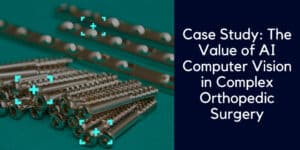What’s inside:
This case study looks at the management of non-implantable sterile medical devices (DMS) in a Interventional Cardiology Unit using the TotalSense Mobile Scanner and Application.
It highlights:
- The background and challenges faced by the hospital
- The goals of the implant management project
- The solutions identified
- Project implementation
- Results and outcomes, including expiry management, staff capacity and stock levels.
Background to Implant Management Case Study
Hôpital de la Croix-Rousse – Hospices civils de Lyon was looking for an automated solution to manage their disposable, non-implantable sterile medical devices in the interventional cardiology suite.
The average number of procedures performed per month at the Interventional Cardiology suite is 230. The non implantable medical devices used in cardiac surgeries include items such as angiography, balloon and diagnostic catheters, as well as sutures.
It should be noted that while there are many studies on the use of RFID technology for the management of implantable medical devices, there is limited data on its use to manage the supply of non-implantable disposable medical devices.
This case study provides feedback and data after the implementation of mobile RFID implant management technology in the Interventional Cardiology Department at Hôpital de la Croix-Rousse where non implantable medical devices required item level management.
Implant management in France
In the French healthcare system, it is the Pharmacy Department that leads on the enrolment, tracking and management of both medicines, medical devices and implants. There is a strong culture of consignment within the French healthcare sector, with a tendency for non-implantable items to be owned stock, and implantable items to be vendor-managed inventory.
There are strong European regulations in place requiring each medical device or implant to be registered – this is for consigned items held on site, as well as for purchased stock. Annual audits take place where checks are made that the inventory at hand is all digitally recorded in the system and can be easily tracked.
RFID smart cabinet technology is growing in popularity in France and is being seen as an easy-to-implement system that supports regulatory compliance, patient safety and strong implant and medical device management.
The Hôpital de la Croix-Rousse was managing disposable medical devices manually which was resource-heavy, caused inefficiencies, and made it difficult to ensure the continuous supply of this vital inventory.
The hospital was keen to introduce technology to streamline processes and add precision to their medical device tracking. They wanted to gain better insight into their inventory and use accurate data for planning and procurement.
Implant Management Challenges for the hospital
Similar to many French healthcare facilities, The Hôpital de la Croix-Rousse had the following challenges:
- The Pharmacy Department found it difficult to track inventory after it had been registered in the hospital system and was dispatched to the point of care.
- They wanted to achieve item-level implant tracking for full implant traceability, and to be able to demonstrate compliance with European legislation during annual audits.
- They were unable to achieve real-time visibility of changing stock levels.
- They wanted to reduce the labor involved in managing their medical device and implant inventory and to improve the accuracy of stock data.
Goals of the project
The Pharmacy Department at the Hôpital de la Croix-Rousse had the following goals for the introduction of automated RFID technology for medical device and implant tracking in the Interventional Cardiology suite:
- To introduce an automated inventory management system that provided better visibility and control of their inventory.
- To retain vision of every tagged item after it is sent to the point of care. Item traceability is their main priority, and they seek item-level implant tracking from receipt to consumption.
- To optimize their inventory by achieving demand-driven procurement that results in a balanced inventory, reduced costs, improved expiry management, and lower wastage.
- To end shortages and stock-outs – ensuring continuous supplies of all inventory items.
- To reduce the time spent by the pharmacy team on managing medical inventory in the surgical setting.
- To enhance the quality and quantity or inventory data, in order to drive through operational excellence, improved cost efficiencies, and more informed planning.
- To find a system that seamlessly integrates with their own software for ease of data-sharing and full interoperability.
“The project evaluation identified that the value of the stock, now based on recommendations from the system, had decreased to €148,620. Total Sense RFID mobile tracking system achieved a reduction of €31,375 in the levels and value of stock held in the department.”
The hospital did not want to introduce a broader project that included new storage solutions, so any new system needed to build on the current set-up.
In the Interventional Cardiology Department stock was stored in open shelving and hanging spaces. The hospital was searching for a solution that enabled them to continue with their current method of implant and medical device storage but that provided the additional benefits of automation.
The Chosen Implant Management Solution
The hospital sought a solution offering enhanced precision in stock management, while maintaining their current storage methods. With assistance from Promedo, a local channel partner specializing in the French health market and marketing IDENTI’s products, a thorough diagnostic process was conducted.
IDENTI’s TotalSense Mobile emerged as the optimal solution. This app-based technology allows for stocktaking using a device or cellphone equipped with the app. In this way, the hospital will both benefit from advanced automation and will not have to change its storage method. The combination of RFID technology, mobile app operability and an advanced AI cloud management systems delivers full inventory insight and tracking, while retaining the exiting setup. TotalSense Mobile provides precise implant tracking, easy access to up-to-date stock-levels, and automated replenishment based on the real picture.
The Total Sense implant tracking system adds instant precision, digital documentation, and automated expiry management capabilities to the hospitals management of this high value stock. Another vital factor in the selection of this system was the shared stock visibility achieved for all supply chain stakeholders – ensuring that consignment management became a smooth process, without any data disagreements.
“After analyzing data pre- and post-implementation, they found several positive outcomes. Firstly, the new system yielded a favorable economic balance sheet. Additionally, there was a notable decrease in departmental inventory, signifying improved stock control.”

Implementation of TotalSense Mobile RFID Technology
TotalSense Mobile RFID technology provides precise implant tracking, turning regular storage shelving into a “virtual smart cabinet”. The managing software enables key internal and external supply chain contacts to see current stock-levels and item data, and also facilitates automated stock replenishment, based on actual need. The system works as follows:
- The Pharmacy Department tags and registers each item before sending it to the department.
- A mobile hand scanner is used to scan the operating room inventory shelves, capturing and recording every item in stock.
- Expiry management is automated, with system alerts when any item on the shelving has 6 months or less before it expires.
- The managing software provides instant precision and digital tracking capabilities.
- It generates itemized stock level reports, plus a ‘gap analysis’ that compares the items removed from the room since the last scan.
- Items taken but not reported in the system are then identified for further investigation.
A vital factor in the selection of TotalSense is the shared stock visibility achieved for all supply chain stakeholders.
Several steps were taken to implement the new system:
- A total of 1919 tags, across 297 different medical device products, were set up and registered by 4 staff
- Set up included the definition of minimum and maximum stock thresholds for each product, according to suppliers’ consumption and delivery time data.
- An RFID antennae is set up in the operating room, enabling all tagged items to be read
- The tagged items were then placed on the operating room storage shelves.
New onboarding and stock monitoring processes have been developed:
- Upon receipt at the pharmacy, the DMS GTIN is scanned and the DMS are paired with a tag containing the reference (ref), batch, expiry date of the product via a tagging station and dedicated software.
- The tagged devices are delivered to the department and stored by the nursing staff on the regulart shelving.
- A Pharmacy Technician comes 3 times a week to perform stock scanning using the TotalSense hand scanner.
- At the end of this scan, the software extracts the products where the minimum threshhold has been reached and is able to recommend the procurement of the correct restock quantity and also flag all products remaining in stock that have less than 6 months before expiry.
Results and Outcomes
An assessment of the benefits of the TotalSense Mobile system in the Interventional Cardiology Department was undertaken With several baseline metrics were collected in order to understand the impact of the new technology on stock management in the Interventional Cardiology Department. These economic and organizational impact indicators included:
- Monthly stock valuation
- Purchase price of the equipment
- Daily time spent by the hospital pharmacy technician (PPH) and the healthcare team on supply management
- The number of interventional procedures performed
Stock levels and stock value
Expenditure on coronary angiography non-Implantable Sterile Medical Devices (DMS) amounted to €1,015,000. Prior to the introduction of TotalSense Mobile, the department held non-implantable medical devices in stock to the value of €179,995. At the 8 months evaluation, the value of the stock, based on recommendations from the system, had decreased to €148,620. Total Sense RFID mobile tracking system achieved a reduction in the levels and value of stock held in the department as follows: A decrease of €31,375 in the value of stock in the department.

Staff time spent on inventory management
The evaluation found that the Pharmacy Team were investing additional time onboarding medical devices into the system and tagging products in order to achieve full implant tracking once the items were sent to the department. The clinical team experienced a big decrease in the time they spent managing department inventory. An additional 66 mins spent a day on medical device activity by Pharmacy Staff. An average of 30 tags a day were set up by Pharmacy staff. Average inventory tagging and set up time – 1800 tags in 30 minutes. A reduction of 110 minutes a day by the healthcare team spent on inventory management.
Although there was an increase in the time spent by Pharmacy setting up the RFID tags, the team felt that this was an investment as it resulted in the full visibility and traceability items, which was welcomed by the Pharmacy team in terms of understanding stock levels and being able to demonstrate full compliance with regulations.
It also has to be offset against the large decrease in time spent by clinical staff on medical inventory tasks.
Expiry management
Value of expired items held in stock:
- Prior to TotalSense: €5631
- After 8 months using TotalSense: €696
This equates to a reduction of 87.6% in stock that is at high-risk of turning into wastage.
Gaining full control of expiry reduces wastage costs and prevents unnecessary procurement costs as the stock at hand is effectively rotated and prioritized for usage, reducing the number of regular and last-minute orders that are required.
“We wanted to find an automated inventory management solution that enabled us to use automation to track our high value stock, in order to achieve added efficiencies, cost-savings and compliance.”
Conclusion:
The Hôpital de la Croix-Rousse conducted an 8-month evaluation to gauge the impact of the TotalSense Mobile Implant Tracking technology. After analyzing data pre and post implementation, they found several positive outcomes. Firstly, the new system yielded favorable financial outcomes. Additionally, there was a notable decrease in departmental inventory, signifying improved stock control. The hospital achieved full item-level visibility of stock, enabling better understanding of utilization and loss, thus closing the circuit on implants throughout their lifecycle.
Moreover, significant time savings were realized among healthcare staff in the Interventional Cardiology Department, allowing for a shift towards patient care activities. The technology fostered shared vision and understanding, enhancing the department-pharmacy connection. Importantly, the hospital seamlessly integrated the RFID technology without disrupting existing room layouts or storage systems. The Pharmacy Department now feels empowered with full control over high-value implant inventory, ensuring efficient stock management, demand-driven replenishment, and instant traceability for regulatory compliance.
Find out more about TotalSense Implant Management Solution.






